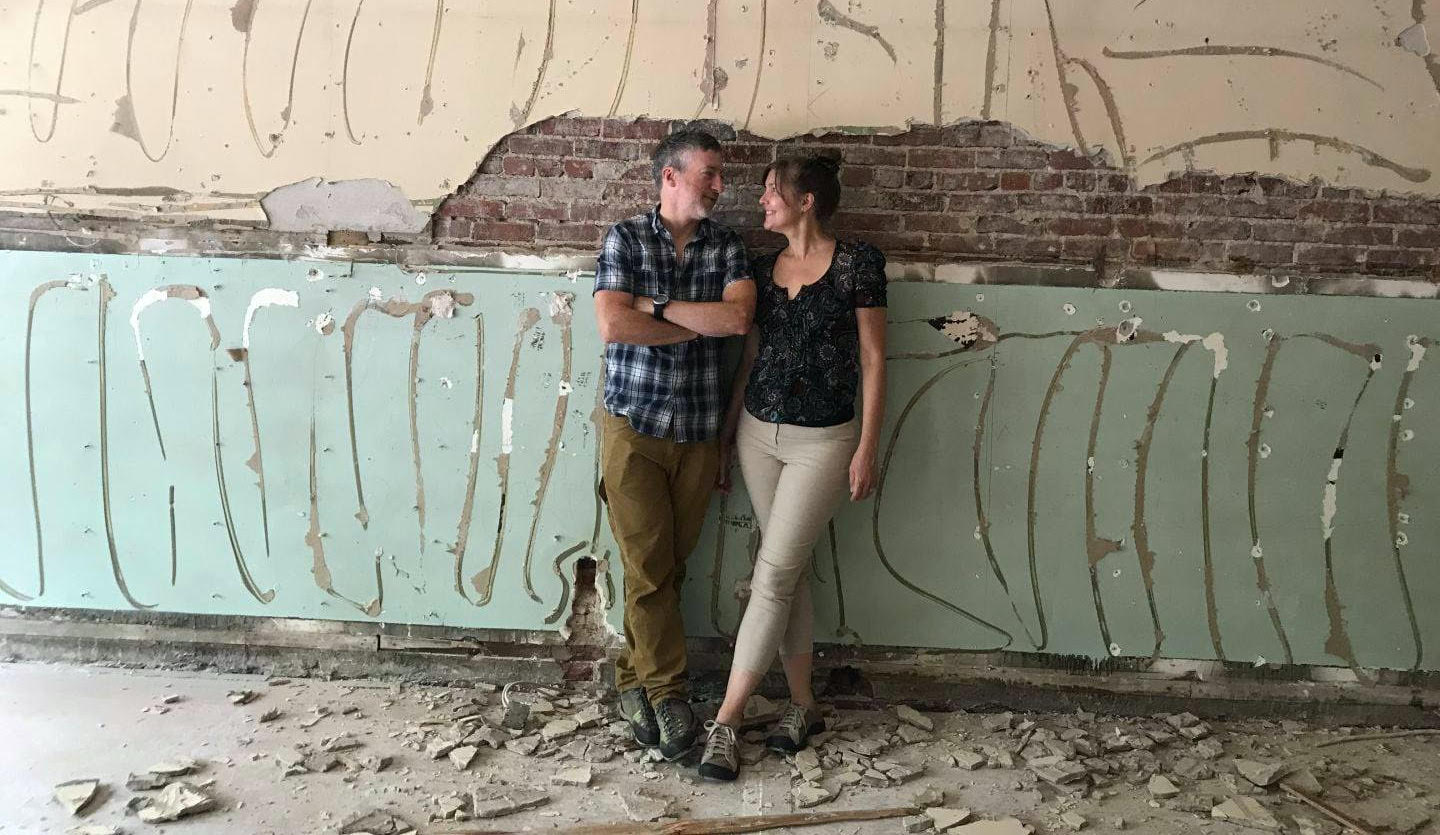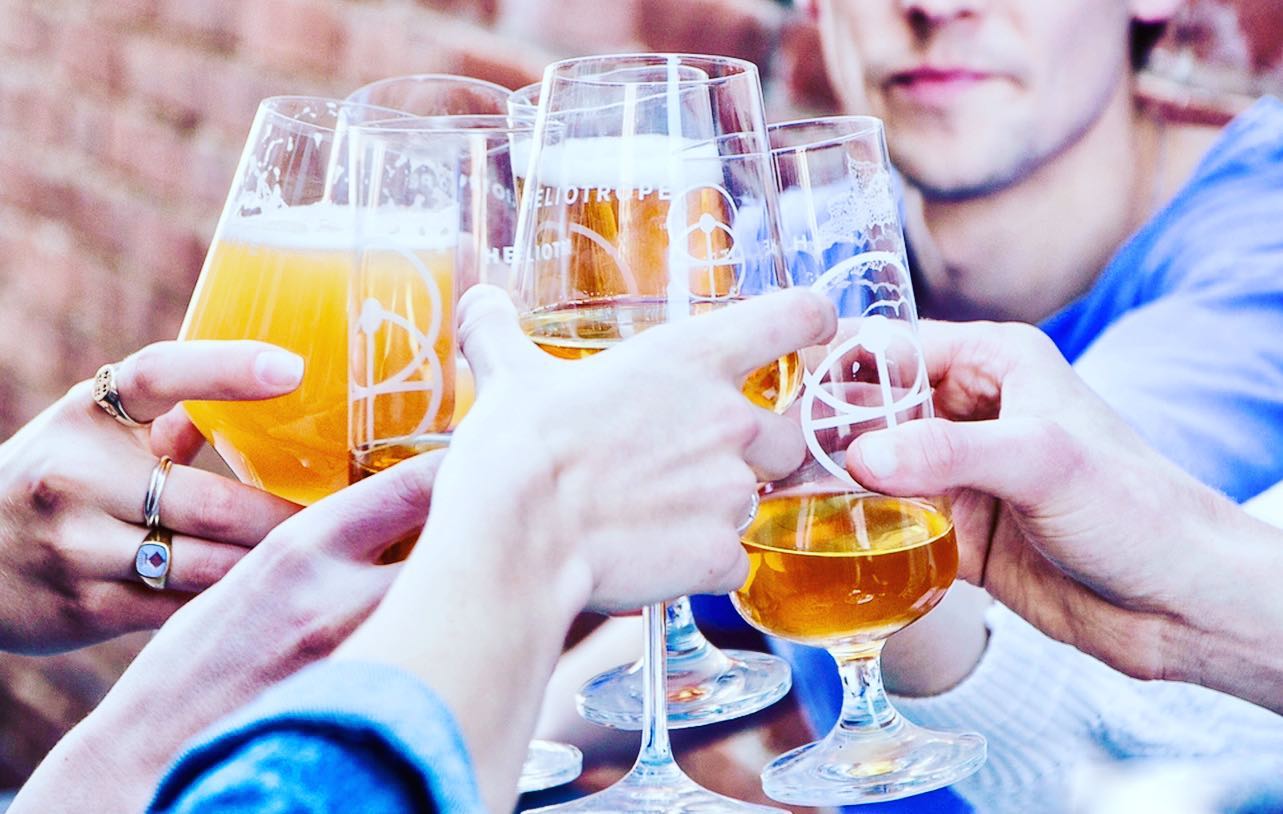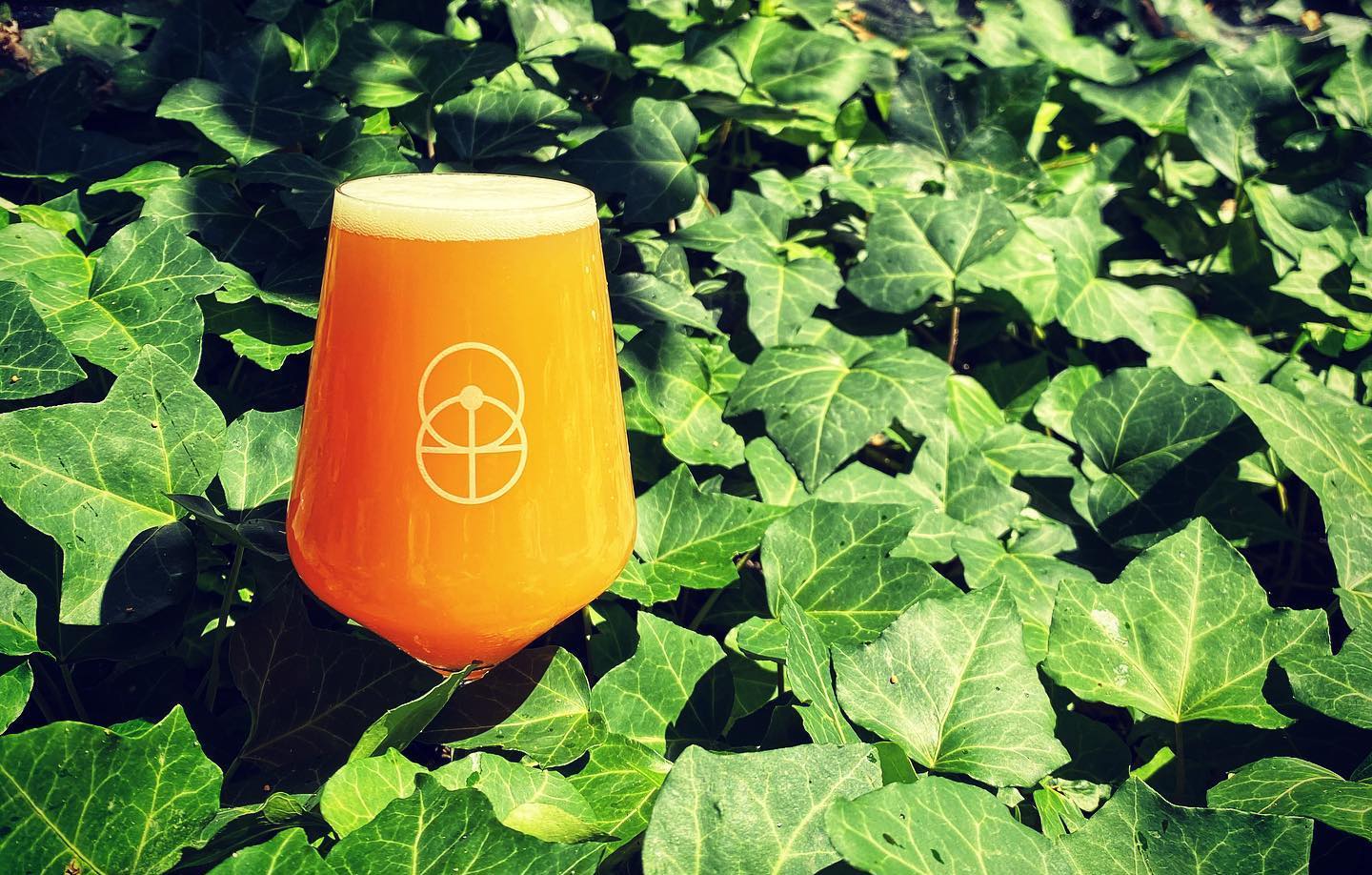Jenny Davies and Erik Jones from Heliotrope Brewery
Founders of Heliotrope Brewery, Erik Jones and Jenny Davies. Image courtesy of Heliotrope Brewery. Right off of Main Street in downtown Lexington, VA, a town of 7,000, you’ll find Heliotrope Brewery. The interior is Scandinavian-inspired, with bright pops of color thoughtfully throughout. The menu is full of unique beers and pizzas, with seasonal ingredients sourced …

Founders of Heliotrope Brewery, Erik Jones and Jenny Davies. Image courtesy of Heliotrope Brewery.
Right off of Main Street in downtown Lexington, VA, a town of 7,000, you’ll find Heliotrope Brewery. The interior is Scandinavian-inspired, with bright pops of color thoughtfully throughout. The menu is full of unique beers and pizzas, with seasonal ingredients sourced locally by surrounding farmers.
Much like the brewery’s namesake, owners Erik Jones and Jenny Davies followed the sun when they chose to open their own brewery, and continue to do so when making decisions for their business. As such, their space is community-oriented, their staff feels like family, and their ideals are pronounced.
In a majority woman-owned taproom that feels like home, prepare yourself for the unexpected. We’re talking ‘90s shoegaze dream pop, roasted grape pizza, and rotating experimental beer taps. This Portland-bred brewer knows what he’s doing.
Tune in to our latest interview with Jenny and Erik from Heliotrope Brewery.
Nancy: We want to learn more about you and how you found your way into the craft beverage industry. Tell me the story!
Jenny: Well, that story is really more my husband Erik’s story than mine. We own the brewery together, and we started it together, but it’s really his passion. I teach at Washington and Lee University. Prior to joining the faculty, I ran a non-profit. With Heliotrope, I take care of the business end of things and he’s focused on the brewery and the artistic end of things. He’s been the driving force and the creative genius behind the process.
Nancy: So Erik, tell us how you found yourself in the industry. What’s the story?
Erik: I spent close to 30 years working in arts administration—I like to joke that that’s 29 years longer than most people stick it out in the arts before moving on. Before moving back to Lexington, VA, where I’d attended college, I was the marketing director for the ballet company in my hometown of Portland, OR, and before that worked at the Oregon Symphony. After 30 years, I figured it was time to have that midlife crisis, but instead of buying a sports car…
I had been a homebrewer for a long time and decided it was time to make a change. Originally I wanted to work for a brewery. We weren’t thinking of opening our own. I went to brewing school at the American Brewers Guild and there was an apprenticeship attached to it. I fulfilled that at Deschutes in both their Bend and Portland facilities.
Deschutes had about 60 brewers on staff when I was there. I was getting ready to turn 50, and I was like, at this stage in my life, I don’t want to start out as brewer #60 somewhere, working the graveyard shift on a Saturday night. That’s when we started talking about opening our own place instead; we could just do what we want and turn it into whatever we wanted it to be.

Co-founder and brewer, Erik Jones, and his hops. Image courtesy of Heliotrope Brewery.
Nancy: Tell me about the vision and what you’re creating in your space.
Jenny: I think it starts with our name. Heliotropic plants, like sunflowers for example, are ones that turn to face the sun as it travels across the sky. With both the beer and the pizza, we “follow the sun” by focusing on using what’s in season at any given time.
We are committed to supporting local farmers in Rockbridge County, where we are located, and in the wider state of Virginia. We’re trying really hard to put money back into the community through buying local and using what’s in season. We try to do that in the kitchen and also with the beer.
Erik: It’s an extension of the sort of things that we like, and we like going to farm to table restaurants, and we like consuming things that are made locally.
Also, on the brewing side, because we’re so small, we don’t really have to worry quite as much about economy of scale. We’re not filling a silo, so it’s okay for us to spend a little more per pound on a bag of grain that was grown in Virginia and malted less than an hour away. And it’s a fresher product. I can drive over to our maltster, Murphy and Rude, the day that they’re pulling stuff out of the kiln, and get something super fresh.
We always wanted to play around with local yeast, too. We spent over a year foraging and harvesting wild yeast from our environment. Luckily there’s a university in town where Jenny teaches, and I’m friends with the head of the biology department, who’s also a brewer. We collected about 30 different wild yeast and bacteria cultures, and he and I spent a year isolating and testing them, to find a yeast strain that would ferment and would taste good. The mixed culture we finally chose came off of a basil plant from Jenny and my backyard.
Nancy: Well, what’s growing and being served right now?
Jenny: We have an asparagus and goat cheese pizza. That’s amazing. We actually have this roasted grape pizza right now, which, when I first heard of it, I was like, I don’t know about roasting grapes, but it is really good. Unusual combinations like that.
Nancy: What’s a favorite of yours that’s on tap?
Erik: Well, the one we just put on yesterday I’m excited about because it uses our wild-foraged yeast by itself. We almost always use our wild yeast and bacteria together to make a sour beer. This time though, I wanted to see what that yeast would do alone, without the souring bacteria from the mixed culture in there. I was surprised how much it tastes like a Belgian Saison just with yeast from Virginia. We brewed it like a traditional farmhouse ale. It’s got a lot of spelt in there and we use some French and Slovenian hops.

Showing off the fresh local produce, here’s Heliotrope Brewery’s fresh summer fig pizza. Image courtesy of Heliotrope Brewery.
Nancy: What is the experience like in your space?
Jenny: The taproom has this Scandinavian kind of feel because it’s very monochromatic with really bright pops of color here and there. Our tables are made out of old farmhouse doors and we have this one great tangerine door that I love.
Our vision for the taproom was one of community. We don’t have any televisions, we don’t have any karaoke, we don’t have any live bands inside. Before COVID hit, we had community tables where people sat together; it was all about promoting conversation, community, and a place where families can come with their children.
Nancy: What are some of the things you do to get the word out and keep people coming in?
Erik: Luckily, we’re in a small town. So everybody local knows we’re there. We’re now starting to get people in neighboring towns to come over too!
Jenny: We primarily use Instagram and Facebook. Because of Erik’s marketing background, he has a very specific aesthetic that he wants for images. We’ve actually just recently started working with someone who’s going to build us a website because we really need one, and we just haven’t really had the extra cash to do it before now. (Check out their new website here!)
In the taproom, we feature different artists every month on our walls. Sometimes we have paintings, sometimes we have photographs. Whatever the local artist does.
We also have a program called Sharing Sundays, where every Sunday we donate a portion of our sales to a local nonprofit. A lot of the time, that will bring in people who want to support the charity that’s being featured.
Nancy: Let’s switch gears a little bit: tell me about your team. Who is your crew and what makes them awesome?
Jenny: We have 4 people on staff who work the bar, and they’ve been with us from pretty much the day we opened until today, and they’ve been great. Erik and I don’t have to be there all the time, every single day. They’re really hard workers.
The kitchen is quite a bit bigger staff. There are 8 or 9 people who work in there.
They’re encouraged to contribute and to try things and to all come up with menu items. We actually have one guy who started with us as a dishwasher when he was 15, but had a real obvious affinity for cooking right from the start. He’s demonstrated so much interest and has earned the opportunity to show what he can do. He’s contributed pizzas to the menu, and now, as a high school senior, works as a kitchen lead as well.
Erik: From the very beginning, we really wanted—this is such a hokey thing to say—to have a staff that was like a family. We want to treat people well. I think maybe breweries in general tend to be better about this than restaurants a lot of the time, but we didn’t want to pay people that two dollar minimum wage. We pay them a lot more than that, plus they get their tips on top of that.
And there’s a practical reason for it because it engenders a sense of loyalty. People want to stick around for that reason. We didn’t start a brewery because we wanted to buy a speedboat. We want to be successful, we want to be profitable, and we want to be able to retire someday, but we also don’t want to do it on the backs of our employees.
Nancy: That’s awesome. And that’s not hokey at all, we love hearing that.
Erik: Our accountant just told us today, our labor versus sales ratio is so much higher than every other client she has and we need to fix that. I told her that’s on purpose.

Image courtesy of Heliotrope Brewery.
Nancy: Do you have any programs or do anything in your taproom to educate your customers on craft beer and the craft beer experience?
Erik: Every single one of our bartenders has their cicerone beer server certification. Also, Murphy and Rude, our malt house, produces these really cool tabletop flip card books with all the details of all the malts that are in our beer. So people can sit at their table and read about the ingredients. And on our menus, when we describe the beers, we like to say exactly what’s in every single one of them. We also mark on there what’s local, whether it’s from Virginia or North Carolina. So we try to really drive home the ingredient list and what everything contributes to the beer.
Jenny: Part of the reason we wanted our taproom staff to be cicerone certified is so that they are an educational arm. There’s so much conversation that goes on when people come up to the bar and they don’t know what to order. They might know they like a certain style of beer, but they don’t know which thing on our menu is the most like that. Our goal was to have our bar staff be able to help people learn about craft beer a little bit more, and figure out what they like, and what things are called.
Erik: But also to be able to talk to the Beer Geeks, too. When someone comes up to the bar and says, “Oh, well what hops are in that one versus that one?” We want people who can answer that question and also say what those hops bring to the beer.
Nancy: When you look back, what’s the one thing you look at and say, “We really did that right!” Something that has contributed to your success so far.
Erik: For the most part we stayed true to who and what we wanted to be. We wanted a place that was built around community and with people talking to each other. So, we made a conscious choice not to have the TV’s, not to have live, amplified music, or trivia nights.
Jenny: A lot of our decisions were a leap of faith. We live in Lexington, Virginia, where sometimes it feels like the Civil War is still being fought. There’s a lot of history here, for better or for worse, and people come to Lexington because they want to experience that history. We wanted to go a completely different way with Heliotrope; it’s so different from that aspect of Lexington. I feel like that was a good risk and it was one that I’m glad that we took.
Erik: Like Jenny was saying, this part of the country, maybe even more than the rest of the country, is so politically charged. There are things we believe in that we don’t think should be political—it’s about being a decent person. We’ve gotten a little flack along the way, but we’ve stayed true to our ideals.
Image courtesy of Heliotrope Brewery.
Nancy: If resources and time weren’t an issue, what’s something you love to do?
Erik: I wish we had more space. Our actual brewing area is small—it’s a 5-barrel system with 6 tanks in the cellar space. There’s a basement under the brewery and we actually had this trap door put in the floor so that we could run a hose downstairs and start a barrel aging program down there. COVID put a pause on that idea, so right now it’s still just storage.
Nancy: What do you see the future of breweries looking like over the next couple of years?
Erik: Oh, I see it as a continuation of what’s already happened. Things are getting more and more local, which I think is great for places like us.
I always like to compare it to how coffee shops used to be. In college, I got my first serving job because I was the only person that knew how to work the espresso maker. Back in the day, the only coffee out there was Starbucks! But now, you go to any little town and you’re looking for the local coffee roaster where you can get the fresh stuff. I think beer is totally the same.
There’s a stat from the Brewers Association, that there’s fewer breweries now than there were before prohibition, even with the so-called saturation in the Beer Market. It shows that we’ve got room to grow.
Nancy: Tell our readers why they should come hang out!
Erik: I always tell people, sort of half-jokingly, opening this brewery was really an excuse to play my music and make people listen to it.
We have a very carefully curated playlist that people listen to when they come to our brewery—you might hear some cool underground hip hop you haven’t heard before or some awesome shoegaze dream pop from ‘90s Britain or something. That’s what I’m always excited about. Every now and then you’ll see a review on Yelp that’ll say “I went in there and they were playing The Jesus and Mary Chain!” And I’m like “Yes! That’s a win! Who cares about the beer!”
Jenny: I love that our environment is very welcoming. I built the brick pizza oven myself, and the tiles that I put on it have little marble daisies all over it. It’s very feminine and I love it so much. Our whole place kind of feels like if you’re a woman in Lexington, you wouldn’t feel weird about sitting at a table by yourself and reading a book or something. We have parents that come in and play games with their kids. I just really love that feeling that the atmosphere gives.
Erik: We also tried to sort of emulate the breweries that we love. Back to Yelp, we got one review early on that said “These guys are just trying to be like Holy Mountain.” I was like, “Yeah, we are, because that’s a great brewery!”

